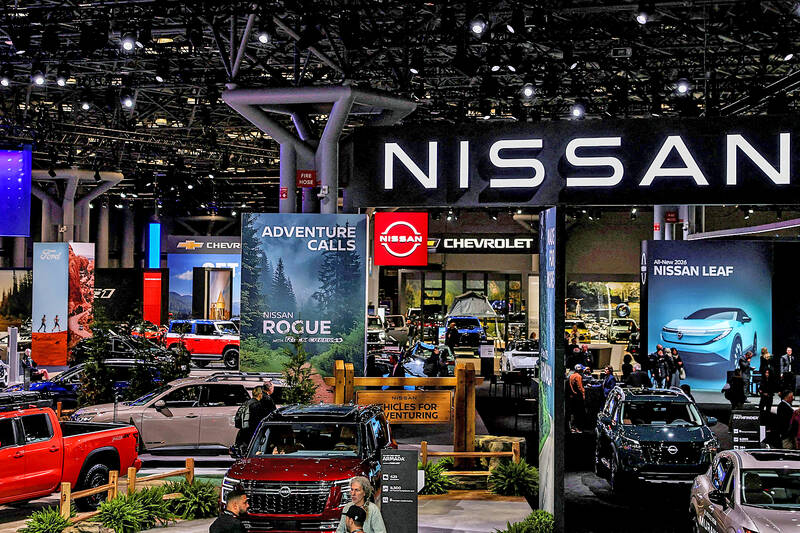Nissan Motor Co plans to cut 10,000 more jobs worldwide, Japanese media reported yesterday, a day before the struggling carmaker was expected to report a record annual loss of about US$5 billion.
Public broadcaster NHK said the decision, in addition to an announcement in November last year that it would slash 9,000 positions, means Nissan is now aiming to reduce its total workforce by approximately 15 percent.
Nissan, whose mooted merger with Honda Motor Co collapsed earlier this year, declined to comment on the reports which also appeared in the Nikkei business daily.

Photo: Reuters
The company — one of the top 10 automakers by unit sales — last month issued a stark profit warning, saying it expects an annual net loss of ¥700 billion to ¥750 billion (US$4.73 billion to US$5.06 billion) for the 2024-2025 financial year.
Its previous worst full-year net loss was ¥684 billion in 1999-2000, during a financial crisis that birthed its rocky partnership with French automaker Renault SA.
The automaker, whose shares have tanked nearly 40 percent over the past year, appointed a new CEO in March.
Nissan this month shelved plans, only recently agreed, to build a US$1 billion battery plant in southern Japan, owing to the tough “business environment.”
An additional headwind is the 25 percent tariff imposed by US President Donald Trump on all imported vehicles into the US.
Of all Japanese major automakers, Nissan is likely to be the most severely impacted, Bloomberg Intelligence analyst Tatsuo Yoshida said.
Its clientele has historically been more price-sensitive than that of its rivals, he said.
One potential solution for Nissan could be Taiwanese electronics behemoth Hon Hai Precision Industry Co (鴻海精密), also known as Foxconn Technology Group (富士康科技集團), which assembles iPhones and is expanding into cars.
Foxconn in February said it was open to buying Renault’s stake in Nissan, and this month agreed in principle to develop and supply an electric vehicle model to Mitsubishi Motors Corp, an alliance partner of Renault and Nissan.
External help is “very much needed” for Nissan, which can no longer differentiate itself from its rivals by making internal efforts to save costs alone, Yoshida said.

IN THE AIR: While most companies said they were committed to North American operations, some added that production and costs would depend on the outcome of a US trade probe Leading local contract electronics makers Wistron Corp (緯創), Quanta Computer Inc (廣達), Inventec Corp (英業達) and Compal Electronics Inc (仁寶) are to maintain their North American expansion plans, despite Washington’s 20 percent tariff on Taiwanese goods. Wistron said it has long maintained a presence in the US, while distributing production across Taiwan, North America, Southeast Asia and Europe. The company is in talks with customers to align capacity with their site preferences, a company official told the Taipei Times by telephone on Friday. The company is still in talks with clients over who would bear the tariff costs, with the outcome pending further

WEAKER ACTIVITY: The sharpest deterioration was seen in the electronics and optical components sector, with the production index falling 13.2 points to 44.5 Taiwan’s manufacturing sector last month contracted for a second consecutive month, with the purchasing managers’ index (PMI) slipping to 48, reflecting ongoing caution over trade uncertainties, the Chung-Hua Institution for Economic Research (CIER, 中華經濟研究院) said yesterday. The decline reflects growing caution among companies amid uncertainty surrounding US tariffs, semiconductor duties and automotive import levies, and it is also likely linked to fading front-loading activity, CIER president Lien Hsien-ming (連賢明) said. “Some clients have started shifting orders to Southeast Asian countries where tariff regimes are already clear,” Lien told a news conference. Firms across the supply chain are also lowering stock levels to mitigate

NEGOTIATIONS: Semiconductors play an outsized role in Taiwan’s industrial and economic development and are a major driver of the Taiwan-US trade imbalance With US President Donald Trump threatening to impose tariffs on semiconductors, Taiwan is expected to face a significant challenge, as information and communications technology (ICT) products account for more than 70 percent of its exports to the US, Chung-Hua Institution for Economic Research (CIER, 中華經濟研究院) president Lien Hsien-ming (連賢明) said on Friday. Compared with other countries, semiconductors play a disproportionately large role in Taiwan’s industrial and economic development, Lien said. As the sixth-largest contributor to the US trade deficit, Taiwan recorded a US$73.9 billion trade surplus with the US last year — up from US$47.8 billion in 2023 — driven by strong

RESHAPING COMMERCE: Major industrialized economies accepted 15 percent duties on their products, while charges on items from Mexico, Canada and China are even bigger US President Donald Trump has unveiled a slew of new tariffs that boosted the average US rate on goods from across the world, forging ahead with his turbulent effort to reshape international commerce. The baseline rates for many trading partners remain unchanged at 10 percent from the duties Trump imposed in April, easing the worst fears of investors after the president had previously said they could double. Yet his move to raise tariffs on some Canadian goods to 35 percent threatens to inject fresh tensions into an already strained relationship, while nations such as Switzerland and New Zealand also saw increased